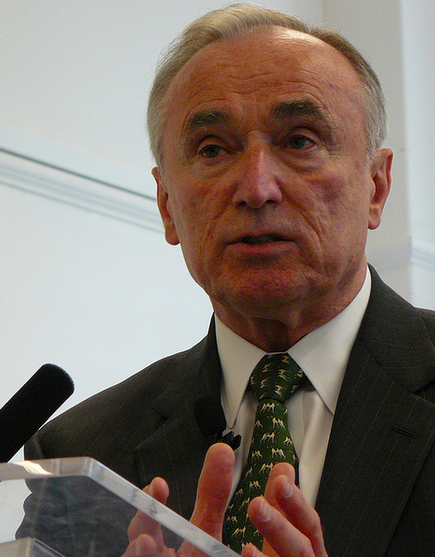It wasn't just an offhand remark. Police Commissioner Bill Bratton has reiterated his desire to eliminate the public plazas at Times Square and go back to the days when people were spilling off the sidewalk into the path of traffic. This time, he's insisting that taking away space for people won't just cure Times Square of topless women and costumed characters -- it'll actually improve traffic safety.

The year after the plazas were installed, pedestrian injuries fell 40 percent at Times Square, and injuries to car drivers and passengers dropped 63 percent along Broadway in Midtown, according to a 2010 DOT report [PDF]. At the same time, pedestrian volumes in Times Square increased 11 percent after the plaza opened.
Earlier this week, the Wall Street Journal crunched the numbers and found that total traffic injuries in Times Square have fallen nearly 25 percent in the five years since the redesign compared to the five previous years. Times Square is safer now than it was before the plazas were installed.
Not so, says Bratton.
"That story was really, very inappropriate in its findings. It took a look at Seventh Avenue and Broadway. It didn’t look at the cross streets, it didn’t look at the larger Times Square area," he said on WGTK-AM 970, reports Politico. "When you look at the larger Times Square area, actually, accidents have gone up. So, all the traffic that has been pushed into the side street... it tells a very different story."
Whatever stats Bratton is referring to, they clearly don't account for the huge growth in foot traffic to Times Square since the plazas arrived. Even if injuries haven't declined -- and all indications are that they have -- with all the added people walking in Times Square now, the average person is clearly safer from traffic.
It's not the first time Bratton has spouted numbers about street safety that have no basis in reality. At the launch of Vision Zero, just two weeks after the start of the de Blasio administration, Bratton claimed pedestrians were at fault for 73 percent of crashes in which a pedestrian was struck by a motorist.
A source was never given for the stat, which ran contrary to multiple analyses. A landmark 2010 DOT report, for example, found motorist behavior to be the main factor in 78.5 percent of serious pedestrian injuries and fatalities.
Even Bratton's predecessor, Ray Kelly, who was a perpetual disappointment on traffic enforcement, never meddled in the city's street redesigns. But Bratton seems to have no appreciation for the value of having decent public space in the most crowded part of the city. He just wants to drive down Broadway through Times Square again.
“My personal preference, my professional preference based on the statistics I look at, is to take them out. But I am not the final say,” he said, adding that's up to the city's “political leadership."
Here's a reminder of how Times Square functioned back when it had Bratton's preferred layout:
Bratton got one thing right: It's not his role to make decisions about street design for the transportation commissioner and the mayor. But Mayor de Blasio still hasn't put this to rest, even internally, and said the plazas will stay.
.@BilldeBlasio declines to take position on whether Times Square pedestrian plaza made area safer. Says it's being studied.
— Erin Durkin (@erinmdurkin) August 27, 2015





